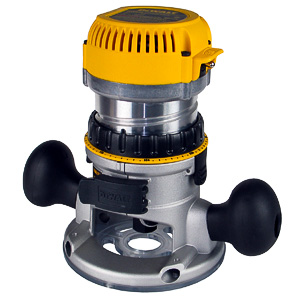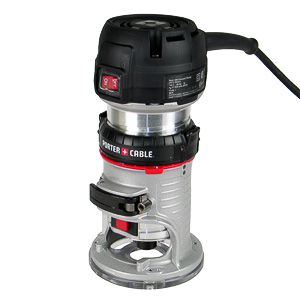Router Product Guide
Top Products | |||
| Recent Reviews |
09-29-2014 4:40 am After reviewing the fixed base version a coupleof weeks ago, I was very excited to get my hands on the MRP23EVSplunge router this week. If the engineering on the fixed baseversion is anything to go by, this router could be challenging forthe title of "Best Plunge Router in the Land". Let's take a look atwhat the MRP23EVS brings to the table, and how it sets itself apartfrom the competition. ... 08-27-2014 7:43 am Routers are some of my favorite tools to review.There are so many things about a router that a manufacturer can getright or wrong. It's impossible to judge a router based on a fewpictures on a website. This week I got my hands on the Bosch MRF23EVS router, a tool Ierroneously though would be just another average router. Let's takea look at what's so special about the MRF23EVS. The Bosch MRF23EVS Router... 03-23-2014 3:30 pm One of the best values in full-size plungerouters is the Hitachi M12V2. It has all the features of a largeproduction router, but the price tag of a bench router. Needless tosay, I had to get it into my shop. Let's take look if the M12V2performs like a proper plunge router, or if the price is too goodto be true. The Hitachi M12V2 RouterThe M12V2 is a full-size plunge router from Hitachi. Equippedwith a 3 1/2 HP mo ... 07-01-2013 1:23 pm The second part of our Milwaukee 5615 routerreview concentrates on the plunge base. Like the fixed base wetested last week, the plunge base is heavy and very well built. Thesame innovative depth adjustment feature that caused some stirs inthe fixed base review makes an appearance. So far so good. Letstake a look at what we will find upon closer inspection, shallwe? The Fixed BaseThe fixed base is part of all kit version ... 06-23-2013 6:23 pm Working our way through all full-sized routerswe got our hands on the 5615-21, a member of Milwaukee's premierline of routers. Judging from the size of the box it arrived in weknew we were dealing with a serious tool. The 5615-21 even comeswith a strap to keep your hand in place. Let's take a look if theBodyGrip the line is known for is worth getting excited over, or ifit is just another gimmick. The Milwaukee 5615-21 Router... |
| Router Guide |
|
Routers by Motor draw
|
|










 Overview
Overview Shopping Guide
Shopping Guide



